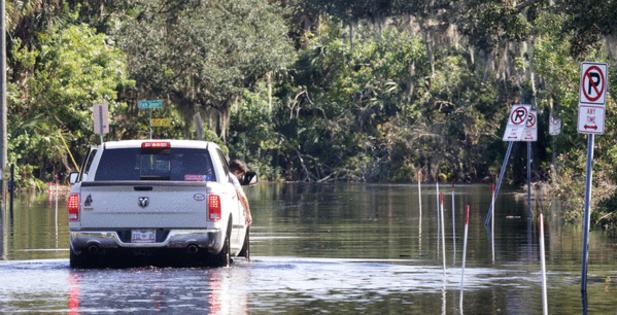Commentary: First Helene. Then Milton. Do you need flood insurance?
Published in Op Eds
Hurricane Helene wreaked havoc across the Atlantic region. One area particularly hard hit was in western North Carolina, which typically does not experience extreme weather events. Hurricane Milton then swept across Florida, causing widespread flooding.
These events may give the insurance industry ample incentive to market flood insurance across these regions, as well as other areas that do not have a history of flooding. This begs the question, should you heed such marketing efforts and buy flood insurance?
Before answering this question, one needs to make a deeper dive into what insurance is, and why people need it.
Insurance, in its most basic form, is pooled risk. It provides people and organizations the opportunity to protect their assets against losses that they cannot afford to lose. By paying insurance premiums for such coverage, they then gain protection if a loss occurs, permitting them to recoup their assets.
Yet there are no free lunches when purchasing insurance. Insurance companies assume the risk for losses in exchange for the premiums paid to them. If a large and diverse pool of risk of assets are insured, and a small enough group of insured experience losses, the excess collected (total premiums minus total losses paid) is retained by the insurance company. Such monies are used to pay expenses like commissions to insurance agents and other overheads for running the company. Marketing ads that feature well-known athletes and personalities are also not cheap. What remains are profits that accumulate and are invested, providing a buffer against future losses.
If risk is managed well, and premiums are set appropriately, companies that underwrite property and casualty insurance can be highly profitable. In 2023, the industry earned $88B in profits, an all-time record and twice the amount earned in 2022. Profits in 2024 are on track to be even higher. This may be due in part to overpriced premiums relative to the risky events that they cover.
What makes insurance companies so profitable is that they are positioned to serve as the “House” akin to gambling casinos, skimming off each “bet” to reap handsome profits.
Yet when unexpected disaster events occur, people are prone to panic, and insurance companies wisely exploit such emotional responses. This pushes people to buy insurance that they may not need to protect their assets against events that are statistically rare.
A look at the assets and profits for large insurance companies bears this out. State Farm is one of the largest property and casualty insurance companies in the world. Their 2023 financial report shows a strong balance sheet, with State Farm Mutual showing net assets of nearly $135B. They also reported paying $12B in property and casualty claims in 2023, which include the types of claims paid in response to events like Hurricanes Helene and Milton.
For every dollar that people pay in premiums, as much as 15% are paid directly in commissions to the agents who sold the policy, though the more typical commission for policy renewals is under 10%. Other expenses further whittle the amount returned to policy owners. By comparison, Las Vegas casino slot machines typically return between 91 and 93% to the players, a number that is too large for insurance companies to return to policy owners.
What all this means is that insurance is valuable to carry for assets that a person cannot afford to lose. However, the likelihood that a claim will ever be made is often small. In fact, if a person or organization files too many claims, insurance companies may classify them as high risk and drop their coverage or raise their premiums commensurate with the risk they pose based on the excessive claims they file.
Insurance companies manage risk by balancing the property and events they insure against across multiple categories. This may include weather events like hurricanes in the southeast, tornados in the Midwest, and earthquakes on the west coast. Often payouts for events in one area are offset by premiums collected in other areas.
So should everyone immediately purchase flood insurance, given the chaos caused by Hurricanes Helene and Milton? The insurance companies will certainly make the case for its benefit and market such coverage accordingly. What will be difficult to understand for most are the true risks involved. Emotional marketing appeals that promote insurance buying “peace of mind” are effective in swaying consumers, but rarely provide good value for all.
For large insurance companies, payouts in response to events like Hurricanes Helene or Milton can be absorbed, given their large asset base and ongoing revenue streams. Moreover, large insurance payouts in one part of the nation can impact people’s premiums anywhere in the nation.
The ideal strategy for people is to take a minimalist view of insurance coverage. Only cover what is essential, at the minimal level necessary in the event of a loss, and for what you define as your own peace of mind. Then save the premiums not paid as a buffer to protect yourself against future losses if it is needed. At the end of the day, the majority of people employing this strategy will come out ahead.
So the next time you review your insurance needs, heed such advice. It may result in exactly the same coverage you currently carry, or perhaps even more. Most likely, it will result in less coverage, and a few extra dollars for you to put away, for a rainy day.
_____
Sheldon H. Jacobson, Ph.D., is a professor of computer science at the University of Illinois Urbana-Champaign. He uses his expertise in risk-based data-driven decision-making under uncertainty to inform public policy.
_____
©2024 Tribune Content Agency, LLC.




























































Comments